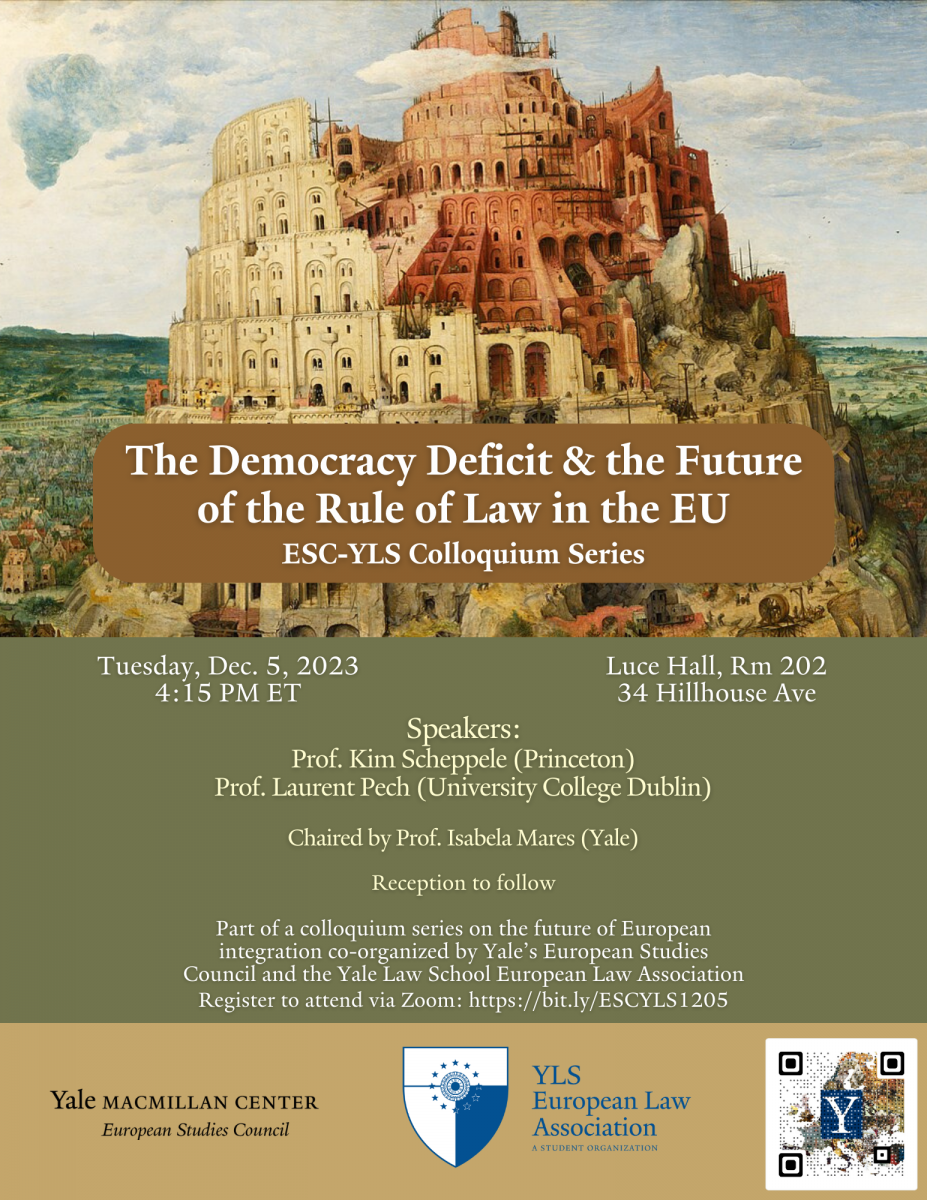European Studies Council and Yale Law School Colloquium Series
The European Studies Council and Yale Law School Colloquium Series is a year-long series on the future of European integration. It is co-organized by the European Studies Council and the Yale Law School European Law Association.
Watch video recordings of the series on the European Studies Council YouTube channel.
Upcoming Events
ESC-YLS Colloquium Event #4: Rethinking Democracy in and for the European Union | Tuesday, April 9, 2024, 4:15pm ET
The absence of democratic control at the EU level has challenged the legitimacy and functioning of the EU which boasts Democracy as one of its fundamental values, especially in the context of the postwar order of authoritarian liberalism. This panel aims to identify the challenges that await the EU regarding the (de)vitalization of democratic credentials as well as discuss the future of Democracy in the Union.
Samuel Moyn is Chancellor Kent Professor of Law and History at Yale University. He received a doctorate in modern European history from the University of California-Berkeley in 2000 and a law degree from Harvard University in 2001. He came to Yale from Harvard University, where he was Jeremiah Smith, Jr. Professor of Law and Professor of History. Before this, he spent 13 years in the Columbia University history department, where he was most recently James Bryce Professor of European Legal History. His areas of interest in legal scholarship include international law, human rights, the law of war, and legal thought, in both historical and current perspective. In intellectual history, he has worked on a diverse range of subjects, especially twentieth-century European moral and political theory.
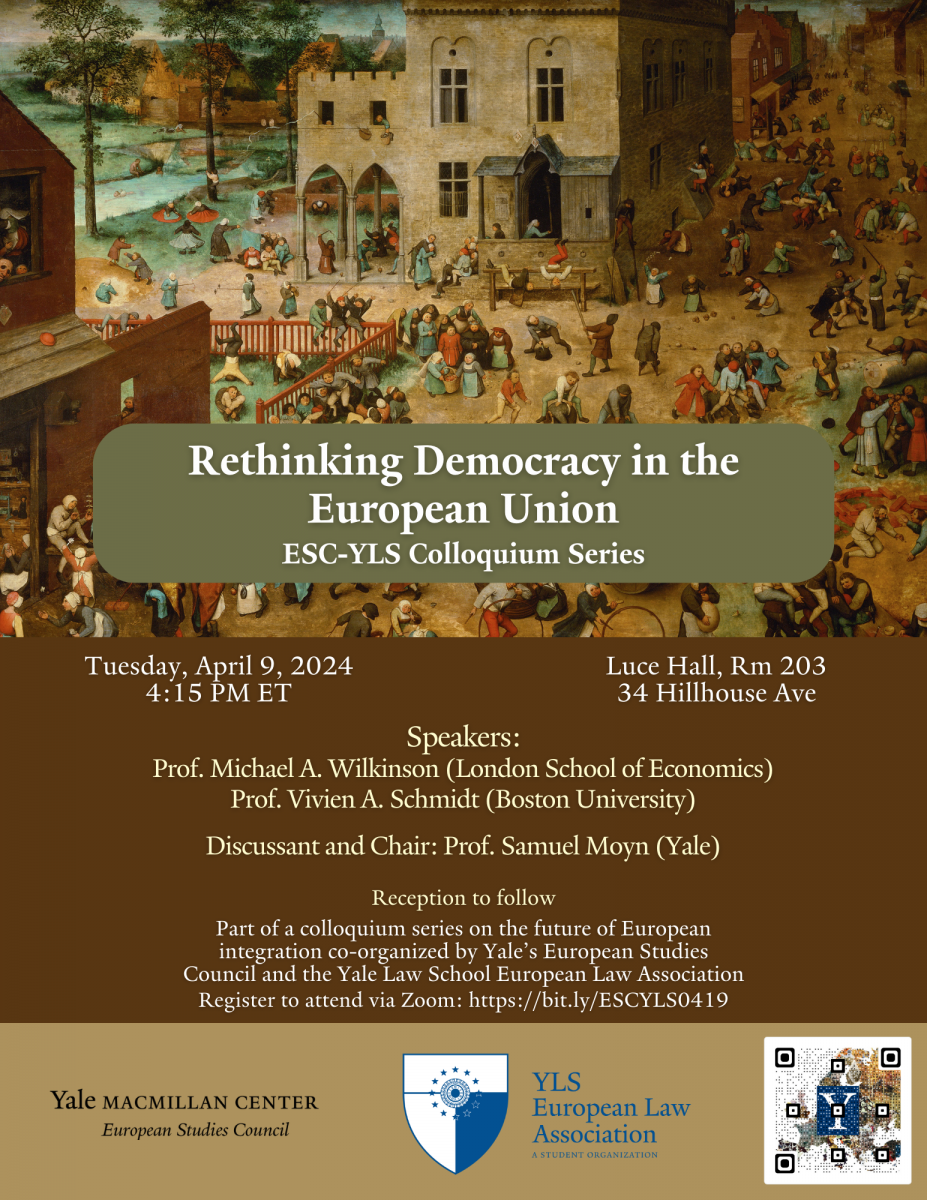
ESC-YLS Colloquium Event #5: Today’s Transformation of Europe | Fall 2024 (Date TBA)
In his seminal article on “The Transformation of Europe” published in the Yale Law Journal in 1991, Prof. J.H.H. Weiler argued that the “transformation” concerned the most the evolving relationship between the EU and its Member States, leaving, on a quite optimistic note, question marks regarding the future road to be taken by the European integration project: will the EU evolve toward a unitarian – a full political Union – or communitarian model – based on interdependence without involving the negation of the State? The last colloquium aims to take stock of the transformations which occurred since 1991. Prof. J.H.H. Weiler will tackle the question of whether the Church of European legal integration is facing and should face a reformation while Prof. Nicholaïdis will discuss the Constitution of a Democratic European Polity.
Discussant and Chair: Prof. Samuel Moyn (Yale University)
Samuel Moyn is Chancellor Kent Professor of Law and History at Yale University. He received a doctorate in modern European history from the University of California-Berkeley in 2000 and a law degree from Harvard University in 2001. He came to Yale from Harvard University, where he was Jeremiah Smith, Jr. Professor of Law and Professor of History. Before this, he spent 13 years in the Columbia University history department, where he was most recently James Bryce Professor of European Legal History. His areas of interest in legal scholarship include international law, human rights, the law of war, and legal thought, in both historical and current perspective. In intellectual history, he has worked on a diverse range of subjects, especially twentieth-century European moral and political theory.
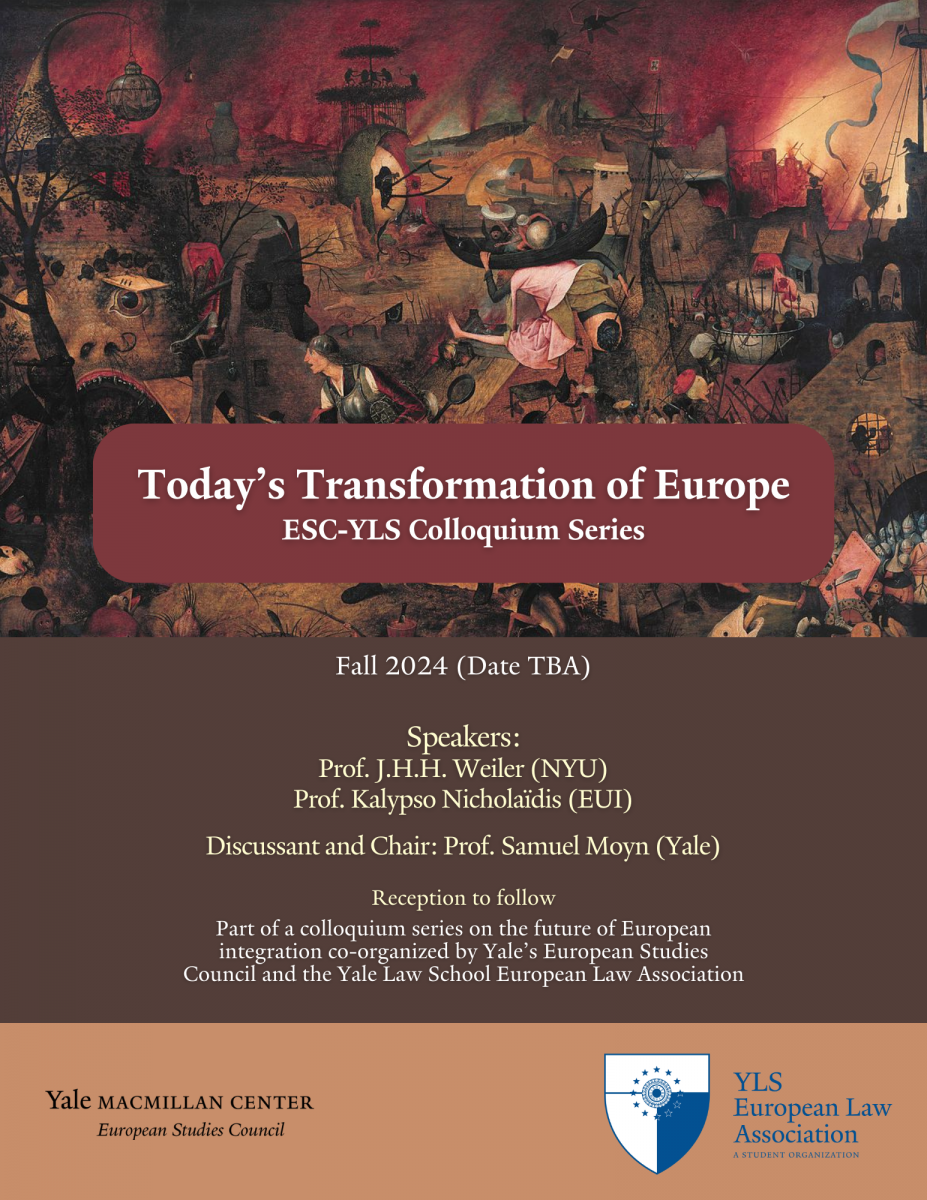
Previous Events
ESC-YLS Colloquium Event #3: The Future of Geopolitical Europe in a World of Energy Dependency | Monday, March 4, 2024, 4:15pm ET
Russia’s 2022 invasion of Ukraine administered an unprecedented shock to the European and global energy markets, triggering emergency interventions and market reforms to limit the impact of the crisis on energy prices and supply security. More fundamentally, the supply shock sparked a profound reappraisal of foreign supply and infrastructure dependencies (for example, on China), leading states to adopt new legal initiatives to strengthen the resilience of their clean energy supply chains. Energy geopolitics and supply security are now firmly back at the centre of global energy policy, and in this new geopolitical reality, we critically need to reassess the role of energy law in the creation - and avoidance - of dangerous energy dependencies. In this panel, the speakers and discussant will focus their intervention on the role of the European Union in light of the Russo-Ukrainian crisis, with a special focus on the dependencies on the energy sector and the connections between natural resources and political development.
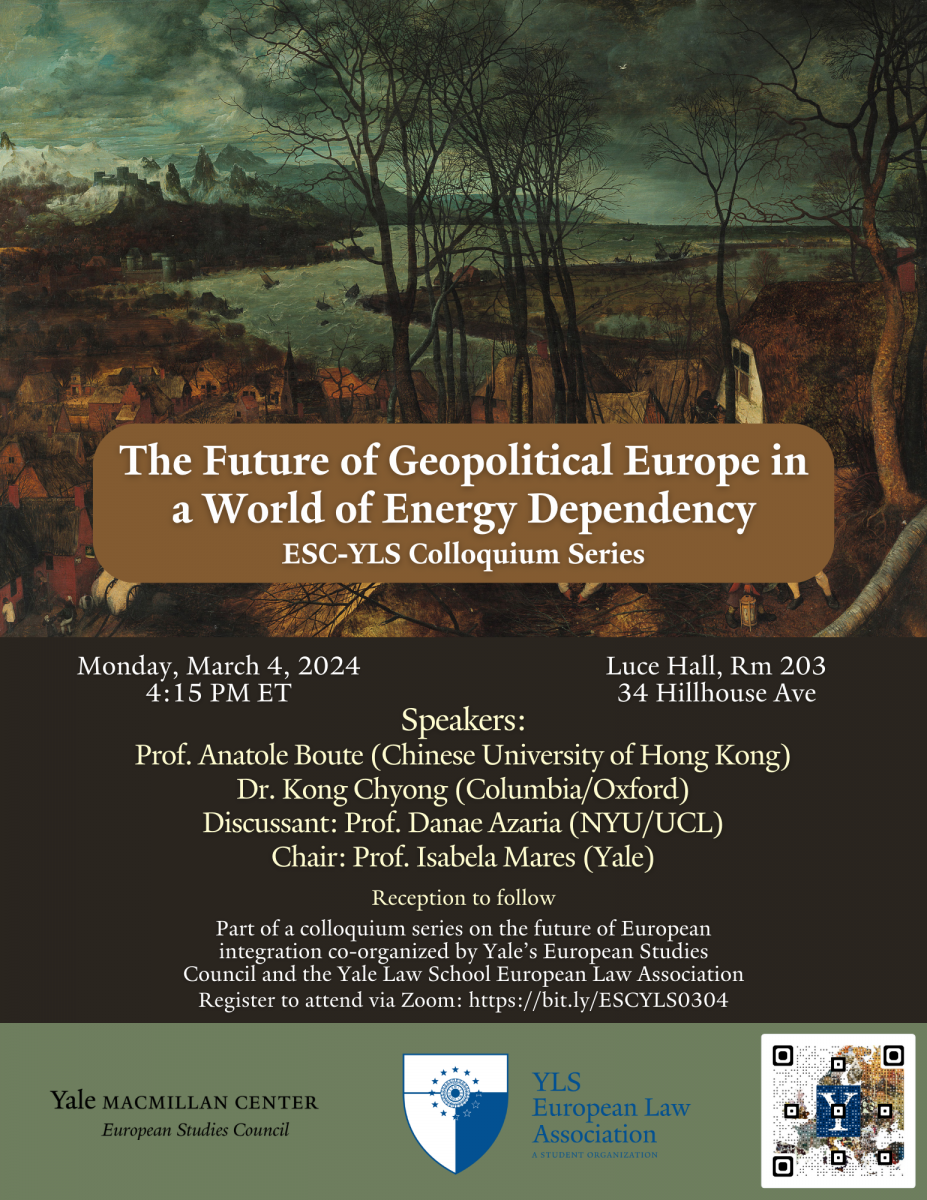
ESC-YLS Colloquium Event #2: EU Borders in a Post-Colonial World | Monday, February 19, 2024, 4:15pm ET
The so-called European “refugee crisis” of 2015 and its aftermath have revealed the true face of the EU: a fortress keeping out third-country nationals from the former colonies leading to thousands of migrants dying in the Mediterranean or at the Belarusian borders, when they are not tortured in the Libyan prisons – financed with EU money. On the other hand, the EU has recently been praised for its solidarity with the Ukrainian refugees welcoming them on the basis of the temporary protection directive although some have denounced the racial selection behind it. This panel aims to discuss the EU as a vehicle of ‘imperial amnesia’ in light of what is happening at EU borders. The speakers will discuss the mechanisms and narrative deployed by the EU and its Member States to keep some migrants out and let others in, particularly in the broader context of post-colonialism and Eurowhiteness.
Seyla Benhabib is the Eugene Meyer Professor of Political Science and Philosophy Emerita at Yale University where she taught from 2001 to 2020. She is currently Senior Research Fellow and Professor of Law Adjunct at Columbia University, and Affiliate Faculty in the Department of Philosophy. She is also a Senior Fellow at Columbia University’s Center for Contemporary Critical Thought. She is currently at work on a Monograph for Polity Press called “At the Margins of the Modern State” and has edited a collection of articles with Ayelet Shachar on Migration and Refugee topics called, Lawless Zones, Rightless Subjects: Migration and Asylum New Border Regimes.
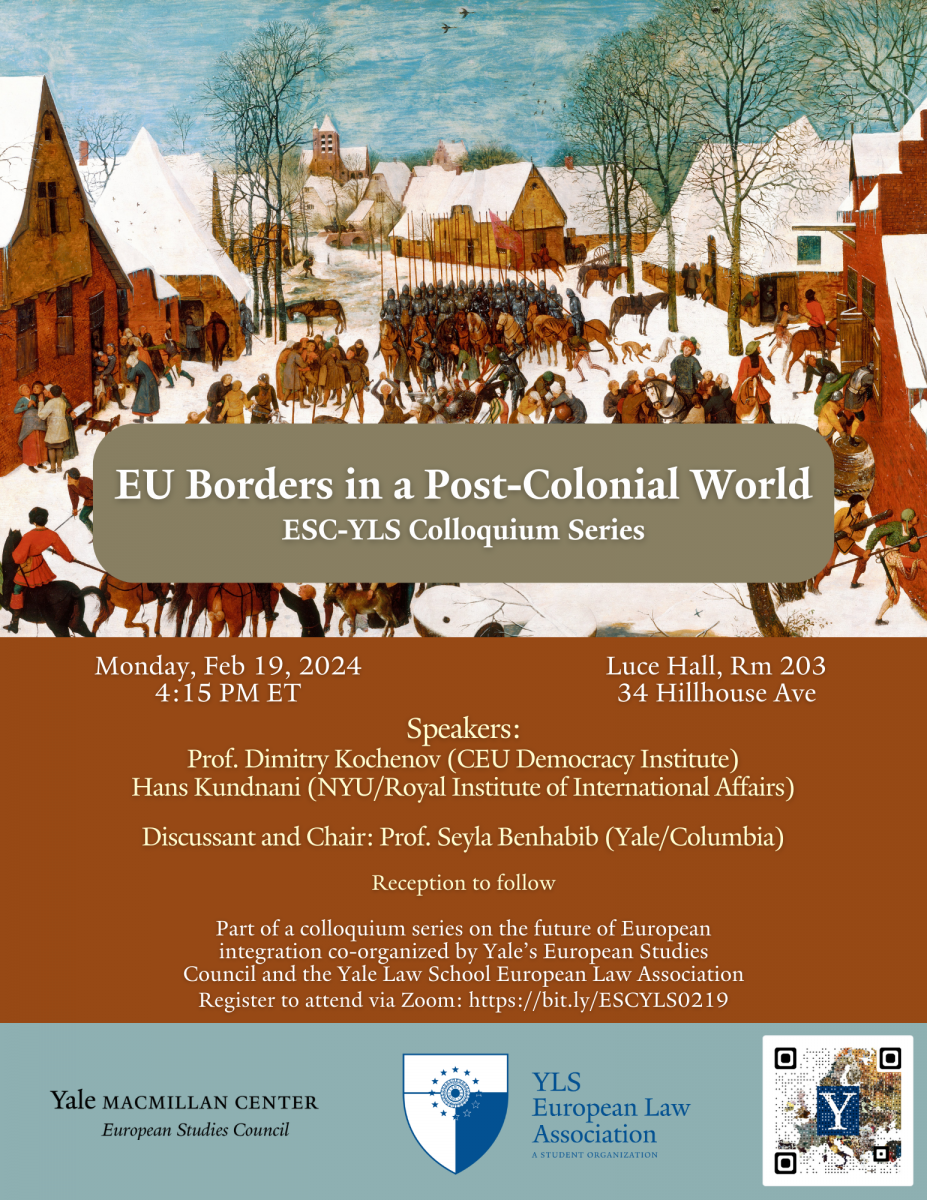
ESC-YLS Colloquium Event #1: Rule of Law Backsliding and New Democracy Deficit in the EU | Tuesday, December 5, 2023, 4:15pm ET
In the past decade, Europe has witnessed a wave of democratic backsliding, erosion of the rule of law, and the rise of illiberal autocracy. In Hungary, Viktor Orbán is using his power to undermine the institutions of Hungarian Democracy while in Poland, the governing party, Law and Justice, has waged war against the independence of the judiciary. Prof. Kim Lane Scheppele, in her seminal piece Autocratic Legalism, speaks powerfully of “constitutional malice” to describe autocrats who hijack constitutions and exploit the superficial appearance of both democracy and legality for their own anti-democratic and extra-legal ends. This panel aims to debate the (in)ability of the EU to face autocracy and the efficiency of the measures adopted by the EU, the cut of EU funds being the latest to date. Professor Kim Lane Scheppele will provide insights into the European Union’s democracy deficit and Professor Laurent Pech will shift the conversation to the future of the rule of law in the European Union.
Prof. Kim Scheppele (Princeton): “The New Democracy Deficit”
Prof. Laurent Pech (University College Dublin): “The Future of the Rule of Law ”
Chaired by Prof. Isabela Mares (Yale)
Kim Lane Scheppele is the Rockefeller Professor of Sociology and International Affairs and director ofthe Program in Law and Normative Thinking (PLANT) at Princeton University. A specialist in comparative constitutional law and European law, Scheppele has focused on the rise and fall of constitutional democracy with a special focus on Eastern Europe. Living in Hungary and Russia for extended periods as these two countries were discovering democracy after Soviet rule, she has also tracked the collapse of democracy in both places, with consequences for the broader European project, in more than 100 publications in social science journals, law reviews and edited volumes in the US and Europe. Her article, “Autocratic Legalism” (University of Chicago Law Review 2018) launched an international research project on the decline of democracy including more than 400 researchers in the Global South and became a best-seller as a small book in Hebrew during the democracy protests in Israel in 2023. Her book, Destroying Democracy by Law, will be out next year with Harvard University Press.
Isabela Mares is the Arnold Wolfers Professor of Political Science and the Director of the European Union Center at Yale. She specializes in the comparative politics of Europe. Professor Mares has written extensively on labor market and social policy reforms, the political economy of taxation, electoral clientelism, reforms limiting electoral corruption. Her current research examines the political responses to antiparliamentarism in both contemporary and historical settings.
Professor Mares is the author of five books. These include The Politics of Social Risk: Business and Welfare State Development (New York: Cambridge University Press 2003), Taxation, Wage Bargaining and Unemployment (New York: Cambridge University Press 2006), From Open Secrets to Secret Voting (New York: Cambridge University Press 2015), Conditionality and Coercion: Electoral clientelism in Eastern Europe (co-authored with Lauren Young, Oxford University Press 2018) and Protecting the Ballot: How First Wave Democracies Ended Electoral Corruption (Princeton: Princeton University Press 2022).
The Politics of Social Risk was awarded the Gregory Luebbert best book in comparative politics award by the American Political Science Association and the best book in European Politics by the Council for European Studies. Conditionality and Coercion was awarded the William Riker award for Best Book in Political Economy by the American Political Science Association, the Best book in European Politics and was a runner up for the Gregory Luebbert Award. Her articles have been awarded best prizes by the APSA sections on Comparative Politics, Representation and Electoral Systems and History and Politics, among others. Professor Mares is a Member of the American Academy of Arts and Sciences and a fellow of the Simon Guggenheim Foundation.
